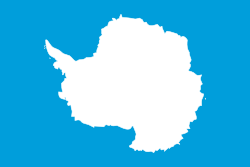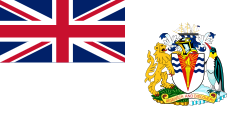| Flag | Date | Use | Description |
|---|
 | 1929 | RRS Discovery crew | Plain white flag |
 | 1978 [1] | Whitney Smith's proposal. | An orange field bearing an emblem consisting of a pair of hands holding a segment of a disk representing Earth with the letter "A" representing Antarctica. |
 | 1995 [2] | Joanne Cooper and Stefan Tucker's proposal. | An orange field bearing an outline of Antarctica, a compass pointing south at the bottom left, and the outline of a penguin to the right. |
 | 1996 [3] | Graham Bartram's proposal. | A white outline of Antarctica on a UN-blue background. |
 | 1999 [3] [4] | Dave Hamilton's proposal. | The pale blue strip represents pack ice, the dark blue stripe represents the night sky and the yellow stripe is a representation of the aurora australis. The famous stellar constellation the Southern Cross is shown in the dark blue stripe at the right. |
 | 2007/2008 [3] | Olivier Leroi's proposal. | The flag is vertically divided in four stripes — black, off-white, orange, and gray — reproducing the proportions of the colors on the "livery" (feathers) of an emperor penguin, selected as Antarctica's emblematic animal. |
 | 2018 [5] [6] | Evan Townsend's proposal (True South flag) | According to the flag's promoters, it signifies: "Horizontal stripes of navy and white represent the long days and nights at Antarctica's extreme latitude. In the center, a lone white peak erupts from a field of snow and ice, echoing those of the bergs, mountains, and pressure ridges that define the Antarctic horizon. The long shadow it casts forms the unmistakable shape of a compass arrow pointed south, an homage to the continent's legacy of exploration. Together, the two center shapes create a diamond, symbolizing the hope that Antarctica will continue to be a center of peace, discovery, and cooperation for generations to come." |











































